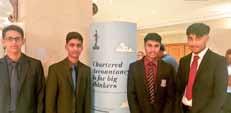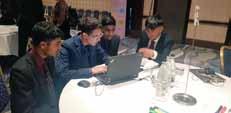
36 minute read
School Life
Staff Research Team
As teachers, the decisions we make in the classroom about what to teach and how to do it are necessarily a response to policy makers and professional politicians, often with an
Advertisement
ideological agenda. However, significant advances in neuroscience and greater mobilisation of education evidence has enabled classroom teachers to develop a stronger voice. At AGS, the Research Team takes evidence informed practice and trials it in our unique context to find the best ways to help young people learn. Ultimately, this will ensure better outcomes for all pupils.
Meet the team and find out about the action research projects we have conducted this year. Full copies of the findings are available from the school.
Vanessa Beckley is Research Lead and Associate Assistant Head at AGS. She has spent 25 fantastic years teaching pupils about literature, life and learning, still fascinated and amazed by the teenage mind. A book that has changed the way she thinks about the human brain is Joshua Foer’s account of competitive memorisation at the 2005 US Memory Championship – ‘Moonwalking with Einstein: the Art and Science of Remembering Everything’.
Louise Pollard completed a BA in Politics and an MA in History and Politics at York University before teaching History and Politics at AGS. While teaching she completed a further MSc in Learning and Teaching at Oxford University. This year she has carried out a small action research project examining how well-being programmes can lower stress levels in Year 11. The book she has been inspired by is ‘Teen Yoga For Yoga Therapists: A Guide to Development, Mental Health and Working with Common Teen Issues’. Dr Adrian Twissell is head of Engineering, Design and Technology. His specialisms include electronics and micro-control. Adrian’s research interests embrace teaching and learning pedagogies that utilise visualisation strategies and their application in the development of abstract conceptual knowledge. His doctoral research explored the use of, and interplay between, multiple representations as strategies for learning about electronics within applied skills contexts. Adrian’s research has been influenced by the synchronous/sequential cognitive processing theories of Pavio (Mental Representations: A Dual Coding Approach, 1986) and Simon and Larkin (Why a Diagram is (Sometimes) Worth Ten Thousand Words, 1987).
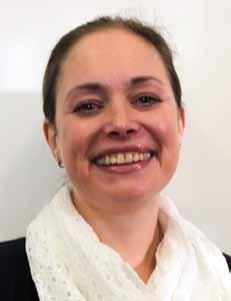
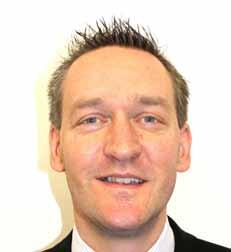
Neil Gibbs is currently Head of Key Stage 3 PE at AGS and a selfconfessed technology nerd. Neil’s passion is in the development and refinement of the curriculum and his department and he is constantly looking for ways to enrich and enthuse the students in P.E. He has been selected by the International Boys’
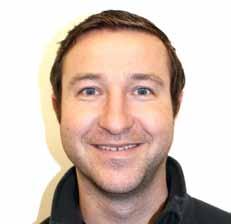
School Coalition to conduct an Action Research project on Student Agency: Boy Voice and Choice this year and has just returned from a Conference in Montreal. He believes his action research project will enable him to develop an exciting change to the Physical Education landscape.
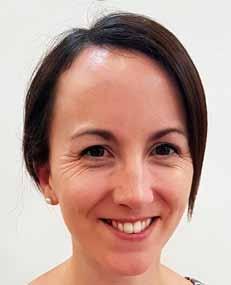
Katrina Blunt is a Teacher of Mathematics at AGS who joined the profession after more than a decade in industry. Her previous career incorporated extensive use of data and research in product development and consumer behaviour. Latest educational research investigated the use of Direct Instruction to aid students’ ability and confidence in problem solving. Katrina is commencing an MA in Education at UCL IoE in September 2019. A recent fascinating read: What if everything you knew about education was wrong? by David Didau.
Liz Smith completed a BSc in Biological Sciences at the University of Birmingham before beginning her teaching career at AGS. She is the Head of KS3 Science at Aylesbury Grammar School and passionate about developing her students to reach their full potential and to become effective learners. She has taken the opportunity to carry out action research into how students can be best supported in their examination preparation to ensure they hit their target. A book she has found both enlightening and instrumental in changing her approach to teaching is ‘Teaching Backwards’ by Andy Griffith and Mark Burns.
Andrew Skinner is just coming to the end of his 10th Year at AGS and is the current Head of English. He is keen to explore and understand the attainment gap seen nationally in English between boys and girls. Having been inspired by Geoff Barton’s ‘Don’t Call it Literacy’, he has spent the last year exploring the possible benefits of a whole-school approach to literacy alongside Jodie Draper.
Jodie Draper is a member of the English department at AGS. Having trained to teach in Australia after a career in editorial, Jodie brings welcome outside perspective to the school. She has been particularly influenced by Alex Quigley, having attended a talk of his earlier this year and read ‘Closing the Vocabulary Gap’. Jodie has worked with Andrew Skinner on researching the benefits of a whole school approach to literacy.
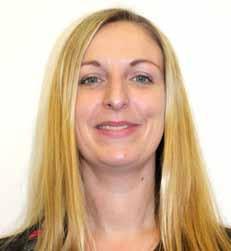
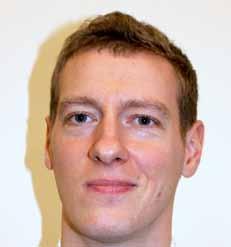
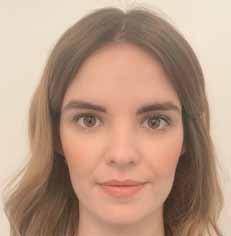
Staff Research Team - NDG Interviews
An Interview with Neil Gibbs, Head of Key Stage 3 P.E. and Action Researcher for the International Boys’ Schools Coalition.
Interviewer – Mrs V Beckley, Research Lead.
Neil Gibbs is Head of Key Stage 3 P.E. at Aylesbury Grammar School where he has taught for twelve years. In June he attended the International Boys’ Schools Coalition Annual Conference at Selwyn House School in Montreal after being selected to conduct a piece of Action Research into Student Agency: Boy Voice and Choice. He believes his action research project will enable him to develop an exciting change to the Physical Education landscape. Funded by the IBSC – the leading voice worldwide in the best education practices for boys – Neil will be an active part of this global organisation over a period of twenty four months, in order to better the outcomes for AGS boys and beyond.
What drove you to apply for a place on the IBSC Action Research Project?
There were a few strands really. Last year I was involved in our Staff Learning Forum – a group of likeminded teachers working together on a cross-curricular project – focusing on how boys learn. Off the back of this, the IBSC topic, Boy Voice and Choice, spoke to me because of the way P.E. is sometimes taught. P.E. can be very instructional, and having the opportunity to try a different way of teaching with strong foundations grounded in research excited me as KS3 leader, together with the chance to implement change in the department.
Second, I’m thirteen years into my career and comfortable with the classroom part of it. This opportunity appealed to me to further my professional development, and I am at a time in my career where it felt right to do that. In terms of my own development, I am excited to be able to lead on an area that is very important in education.
Talk to me a little bit about the Action Research Topic
The topic is Student Agency: Boy Voice and Choice. The first thing that came to mind is how noisy a PE lesson is in terms of engagement and enthusiasm, but then how little that voice is heard in terms of boys being in charge of their own learning. I’ve always grappled with the idea of giving boys more choice. Essentially in our environment we have a lot of boys who enjoy P.E., but I wanted to focus on increasing student motivation in those more passive within the lesson and see if increasing the choice and giving more ownership over their learning would increase their intrinsic motivation.
And what about Boy Voice and Choice?
It’s about empowerment. Giving students a sense of control over what they’re learning and the ability to choose how they are accessing parts of their curriculum.
Can you give me an example?
Well, from my point of view, I’m looking at project based learning. I want to examine to what extent applying a project to a P.E. topic would give students room to make the decisions about how they access the learning.
What does that look like in practice?
Framing a unit within a real-life project with tangible outcomes. For example, a primary school has approached us about how to develop badminton within their school. Students could potentially produce posters, videos, resource cards aimed at introducing the game to Y5 students. Through this, they will in small groups undertake different roles within the unit, have the responsibility to produce written material as well as video demonstrations to produce their product.
Let’s talk about the value of this to boys’ education at AGS
Boyology – or the study of male adolescence – positions boys as the main theme, keeping them at the centre of what we are doing and making sure the research is really focusing on the learning of boys and what we’re teaching them to
do. I see the title as an opportunity to improve my classroom teaching, whereas others read it as something pastoral. The broad topic means teachers can look at what interested them and the needs of their school.
AGS students are able to take P.E. into the wider context of the world allowing students who potentially are less confident practically but who have strengths in other areas such as video editing and written communication to add significant value to a team based project.
And what have you learnt from the experience?
For me, it’s about the whole feeling of self-worth and adequacy – the fact that my research project was chosen over 70 other applicants gave my career significant validation through achieving something on merit. I’ve done all sorts of great things over my career but this was the first actual tangible thing that I’ve earnt. Hearing I had been selected was like rocketboosters!
Tell me about the Conference itself
I am not naturally outgoing, but it was hard not to talk to people – everyone was so incredibly friendly and nervously excited about the whole experience. Having time to talk through our action research proposals and get into the nitty-gritty of the project, bounce ideas off each other in a comfortable and engaging environment and knowing that my ideas were on a par with everyone else was incredible.
How did you spend your time in Montreal?
The days were long – seven o’clock in the morning until six at night – broken up into workshops or speakers or time with the team, followed by a number of evening events. The Senior Research team delivered very good information regarding what to expect from an action research programme - the deadlines and challenges to overcome - using the best examples from the past and showing videos of previous action research projects.
Much time was also spent in our research team of ten – Team Trish – comprising Australians, New Zealanders, an American and a Canadian. This was genuine international collaboration – and I felt massively privileged to be talking to other teachers from right across the world. We were a diverse range of schools on the Research Team – from a big boys’ state school in New Zealand to Eton, Harrow, Aylesbury Grammar School and Dr Challoner’s from GB. We represented different contexts – prep schools, independent schools, state schools, secondary schools, elementary schools - but we all had boys as our focus.
Most memorable moment?
Well, the topic is on Student Agency and to start with they gave us all super-hero masks. From the very beginning the Research Leads encouraged us to get into the topic, breaking it down into what was really meant by Student Agency. We started to realise we were giving students a voice, a choice and ownership over their learning, empowering them to make choices – like a super hero would do!
What do you consider to be the highlight of the Conference?
Team Trish from the 2018-2019 cycle of researchers (Gold Coast, Australia) returned to talk to us about their projects last year, giving great insight into the pitfalls and the challenges ahead, reinforcing all of what the senior researchers were saying about meeting deadlines and the process steps. Allowing us to see a finished project and hearing the impact it has had in their schools
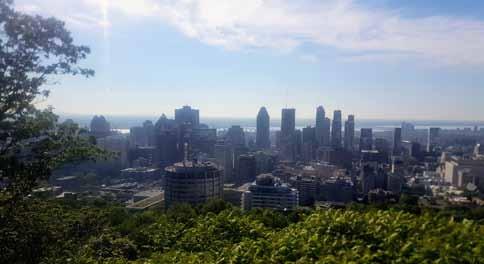
was very inspiring. Some were having great impact locally, in their classrooms; some had a wholeschool impact, and some had spread to reach other districts. The real take-away was that because it was research conducted by teachers in a real setting, it was very easy to see how straightforward it would be to transfer the findings to other settings. For me, that gave me the insight into what I want from my project – that someone could come along and implement my project into their teaching.
This time with the research group was incredibly useful. By the end of the week, I’d come out with a working title and have started developing my proposal.
So what next?
In terms of the action research, it is to complete and submit my proposal and to begin reading for my literature review. The implementation of my project gets underway in November. I will primarily be focusing on Y8 PE classes to do this.
In addition, I want to bring back from Canada the message about research – the benefits – and to inspire and encourage other teachers to get involved. As a school, I feel we are right where we should belong – amongst other Boys’ schools, developing a positive school environment with the boys at the heart of what we do.
And, of course next year I’m looking forward to presenting my findings at the IBSC Conference 2020 in Barcelona!
Art – Photography Club
Miss Rolfe graduated from Sir John Cass College of Art with a BA Hons (first class) in
Photography in 2018. She has also has studied Art, Design and Media as well as being a commercial and fine art photographer focusing on live music & promotional work. The Art department wish to extend their appreciation to the PTA for their generous funding which has supported the photography workshops this year.
Students have been enthusiastic, well prepared and have enjoyed the experience of learning a new medium.
My peers and I, looking to take GCSE Art were given the wonderful opportunity to take part in a photography club run by Miss Rolfe. The notice was sent out but due to the huge popularity of the workshops clubs were held on Thursday and Friday lunchtimes in the Art block. We had the opportunity to try things that we wouldn’t have otherwise been able to do, such as making a camera obscurer out of a room, creating photograms in our very own dark room and taking photos in a studio environment, editing them during the workshop.
We began the first week by making our very own camera obscurer, where we learned how to produce an upside down and flipped images using a camera lens over a small hole in a dark room. We had great fun seeing the outside world reflected inside upside down! We saw people get into their cars and drive past the school. During this session, it taught us about the basic principles of photography, and how an image is produced.
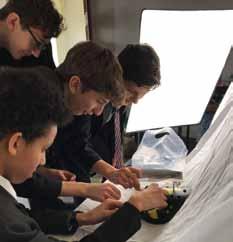
The next week was an exciting one. After being given the opportunity to bring in small items to photograph and develop, we were lucky enough to be able to produce photograms in the dark room. We used a process involving a chemical developer, chemical stopper and fixative. We learned how images were developed when printers did not exist and you had to print using negatives. We did all this in the dark with a red safe light and got some amazing results, developing images of keyrings, keys, headphones and other such items that we felt represented us.
Over the next few weeks, we experimented with studio photography using lighting kits to do product photography, doing Photoshop tutorials, using a scanner as a camera and learning how to use a flash gun.
House Art 2019
House Art is one of the largest participation House events on the competition calendar and is extremely popular here at AGS.
The arts open minds, broaden horizons and help children to learn. They also make a huge contribution to the economy
I have been involved in many of the house events through this year and the one I personally found exciting was House art. This year, Paterson house’s theme was the Wild West. The art works submitted varied from bizarre photoshop edits to exquisite models. Most of the photoshops were not even based on the Wild West theme and so some didn’t make it to the final exhibition.
I, however constructed a cardboard gun, a case for it and a drawing of a cowboy. You were only allowed to make a maximum of 3 entries in the event. Most students contributed a lot towards House Art. Hundreds of various artworks were handed in by the students in Paterson house. Only incredible and exquisite artworks were used in our art exhibit. Fortunately, all 3 of my artworks were used in the art exhibit and the same had happened to some of my friends.
Some of our rivals arrived with worthy matches. Hampden’s theme was silhouette and most importantly, Denson’s theme was Board games. Yes, board games. Even if Denson had found it quite interesting the whole of Paterson and the others found it very mundane and incredibly dull. After about five or six days we had got to know our scores in House art. It was nerve racking and terrifying as this was the first house event that I had taken part in. The scores were revealed. Paterson had come 1st place. I felt so ecstatic and jubilant as we had won our first event. This gave us a head start for Watson trophy. From that moment on Paterson was confident for every house event. We were ready for anything.
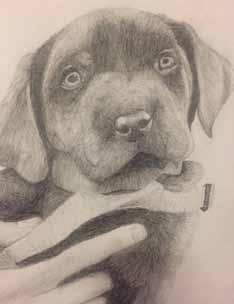
Saravanan Vijay Kannian – Paterson 7
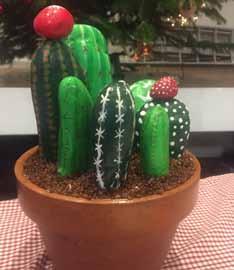
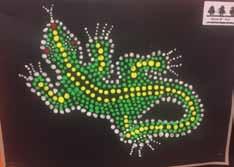

Cabaret Night
Cabaret is always a highlight of the school calendar, and this year was no exception as on Friday 3rd May music filled the halls of Aylesbury Grammar School all the way from 7.00pm
until midnight. After some early ‘muzak’ from Nathan Walemba and friends, the evening formally began with a wonderful set from Mr Dallas and the Junior Jazz Band, before other groups such as Jazz Improv. group and Funktion Band X graced the stage.
Then came the food - the two course meal was enjoyed by all and of course the bar remained flowing all night. A highlight of the evening was seeing the vast array of acts formed independently by students and from Matt Bird’s acoustic cover of Wonderwall to the modern jazz of ‘Alfa Mist’ it is always fantastic to see
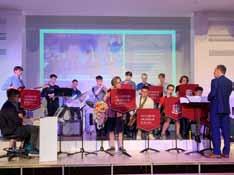
the talent AGS has on offer.
This continued on the second stage in ‘MU2’ as students as young as Year 7 demonstrated that there is a bright future for musicians at the school. Away from the music, Tej Morjaria’s magic show and the sketches of the comedy club made sure those who needed a break from the music were always entertained.
Another congratulations goes to Lee house who triumphantly performed their winning house music set in style, along with a showcase of the outstanding pieces from other houses. From 10 until 12, the dance floor was full as the sounds of AGS jazz band and funktion band provided the perfect finale to a great evening.
Many thanks again to Mr Nathan and Mr Dallas for organising such a memorable evening and we cannot wait for Cabaret Night 2020!
Dylan Holmes-Cowan – Ridley 12
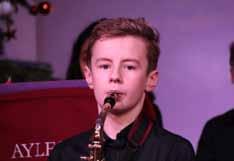
House Music
Another year and House Music was upon us once more. Through weeks of labouring effort, the school’s diverse community of musicians prepared a truly awesome night
of performances. Motivated purely by the desire to compete and conquer (and perhaps some forceful persuasion from the House Captains), everybody’s sights were fixed on Friday 8th February.
This year, we were lucky enough to be visited by Old Aylesburian Chris Price, Head of Music for BBC Radio 1 and 1Xtra, as adjudicator. There was a wide variety of pieces, an incredible depth of talent and an overwhelming feeling of pride in the much-rehearsed pieces. All the houses performed incredibly, with mere points separating each of the houses. Paterson received 20/20 for their performance of Another Brick in the Wall, while Ridley performed a very sophisticated Talking Bata. Denson’s rendition of Chelsea Dagger provided a burst of energy and Hampden finished the evening on a high note with Everybody Wants to Rule the World.
In the end, Lee’s performance of the Dancing in the Moonlight, Sultans of Swing and Smooth brought them to first place. However, as a member of Phillips, we were clearly robbed of victory, finishing an agonising three points behind first place and thus third. Strangely, my friends from Lee disagree: I wonder why? Officially, the Heads of House must deny any connection to corruption and bribery; though I am sure that any “investments” will pay off next year.
Grumbling disappointment aside, the event was truly sensational, with a particularly excellent line-up of musical masterpieces. It was a great opportunity to demonstrate the musical talent here at the school and was much enjoyed by spectators and participants alike. With plans already being made for next year’s event, I wish everybody participating the best of luck and hope that next year’s competition is just as brilliant as the last.
Charles Edwards – Phillips 9
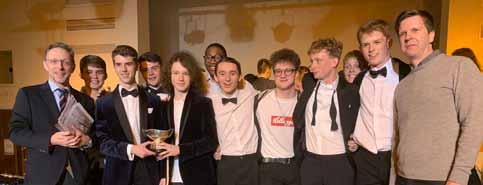
Chess Club
The AGS chess club on Friday lunchtimes in Hi3 provides a friendly and informal environment for players of any age and ability to enjoy matches with their friends
and hone their skills. This year we have been full to capacity with over 40 boys regularly attending. Several of them have used chess as their DofE skill and I am very pleased to have been able to sign off a significant number of chess players. As always the autumn term has seen our chess team compete in the National Schools Chess Championship where players have been up against some of the best in the country. On 14th November the team comprising Callum, Richard, Oscar, Jonathan, Adam and Jack took on several schools in the Regional qualifier held at Reading Blue Coat School. They played well in all three matches and earned a welldeserved place in the knock out stage which pitched them against reading School, last year’s national champions. In a tough match which went the full distance, lasting from 4:30 to 7:30pm they sadly lost 5 ½ - ½ . However, Jack did fantastically to hold his opponent to a draw in a match where our players faced some of the best players in the country. After the games were over, I was extremely pleased to be told by the Reading teacher that our boys were by no means a walkover and played incredibly skilfully. Well done to the team for their sterling efforts. This coming term we now face the challenge of building the team again with 5 players leaving AGS after their A-Levels but there are already a number of keen and able members of the club who want to get involved so things are looking very promising.
The Spring term was dominated by the highly enjoyable Chess Challenge competition with 30 boys competing for prizes and a place in the Mega Final held at High Wycombe. Yuv Saxena, the winner of the AGS stage went on achieve success at the Mega Final and as I write will be competing in the even more challenging Giga Final. Good luck Yuv and well done!
I look forward to another great year of chess club and encourage anyone interested in chess to come along. You will be more than welcome.
Mr M Goodchild
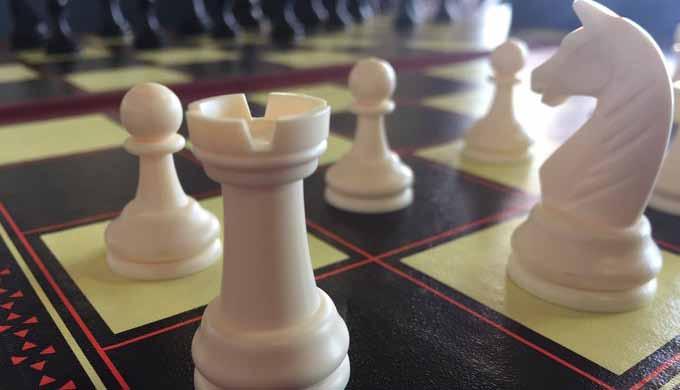
Junior Maths Challenge
This year AGS has had many students enter the Junior Maths Challenge. The challenge is created by the UK Mathematics Trust and is held nationwide.
It is open to anyone who is in Year 8 or below. It is the UK’s most popular maths competition with over 300,000 students taking part each year. It is quite difficult despite being multiple choice, and lasts an hour.
The top 40% of students are given certificates which are bronze, silver and gold in the ratio 3:2:1 respectively. From all the students taking part from across the country, the top 1200 qualify for the Junior Maths Olympiad, and the next 8000 qualify for the Junior Maths Kangaroo. The Maths Kangaroo is similar to the Maths Challenge, since it is also multiple choice and lasts an hour, but the questions require more thinking. The Olympiad is different however, and requires full explanations, which is why we are given 2 hours for the Olympiad instead.
Similarly, there is another set of challenges called the Intermediate Maths Challenge, the Intermediate Maths Kangaroo, and the Intermediate Maths Olympiad. This is open to anyone from Year 11 or below. The challenges are similar to the Junior ones but much harder. However, there are some differences. The Intermediate Kangaroo is split into Grey and Pink as two different difficulty levels, and similarly the Intermediate Olympiad is split into 3 difficulty levels - Cayley, Hamilton and Maclaurin. Also, for the Intermediate Challenge, to get into the Olympiad, you need to be in the top 1500.
I appeared for both the Junior Maths Challenge and the Intermediate Maths Challenge this year. I qualified for both the Junior as well as Intermediate Olympiads, and am happy to say that I reached the top 50 in both Olympiads. I hope I continue to do well in future as well.
All of these challenges stretch pupils far out of their normal maths curriculums. This is what makes them much more exciting than a regular term test. I hope the enthusiasm amongst my fellow students remains high in the years to come.
Yuv Saxena – Hampden 8
Maths – Team Maths Challenge
For the TMC this year, our team consisted of Morgan Billings Ri9, Dom Lai Ha9, George Mansfield Pa8 and I, and once our team was fully assembled we were extremely optimistic of our chances to win.
The competition comprises of 2 parts, the Regional Final, and the National Final, both of which we did very well in. In the Regionals, after using several forms of travel, we arrived in the Mathematics Department of Oxford University. The competition was broken down into multiple parts including: a Group Round in which we all come together to answer mathematical problems, a Shuttle Round in which we break into two teams of two, each team relying on the other’s previous answer to solve the next problem, a Crossnumber which is a mathematical equivalent of a crossword, where Dom and I handled the Across while George and Morgan tackled the Down, and finally the Relay, which is similar to the Shuttle Round, but doesn’t need the previous answer to solve the next and involves a LOT of running!
We only dropped a few marks overall on silly mistakes and so we all knew we had won. After dusting ourselves down from the relay round we went to the college’s lecture theatre, featuring INFINITE WHITEBOARDS! Here, we received our scores and celebrated our victory with our prizes, which were fiddle toys and an invitation to the National Finals!
This was held in the Royal Horticultural Hall in London. The National Finals is similar to the Regional but has more competitors and an extra round, a poster challenge in which we create a poster about a set topic, this time Euclid and his amazing works and a Circus Round to replace the group round which was mostly the same but with movement every five minutes. Our poster went relatively well since we had already prepared
for most of it, and we were confident we would get an acceptable score. Our circus round was also pretty good, in which we only lost 9 marks out of 48. We started messing up in our Shuttle Round, losing ¼ of available marks in one go owing to some very annoying fractions. We pulled it back in the Crossnumber getting almost full marks. The Relay Round followed, which wasn’t a kick in the teeth points wise but still hurt my left leg a bit.
Later we gathered to get our scores back. We were slightly disappointed but honestly not too shocked when our poster didn’t make top 3 and therefore wasn’t announced. Similarly with the overall competition but this time we got our rank of 39th out of the 88 teams on the day. This received mixed reactions with Mr. Matzoros remembering that it was quite a feat to have been where we were in the first place, and the rest of the team wishing we had done better. (Since I am very good at all aspects of mathematics, including probability, I had accurately predicted our rank, and so didn’t really know how to react.) We might have been able to do better, but we did outdo ourselves and did quite well.
Thank you to Mr. Matzoros for arranging the means of transport, helping us find a time and place to practise, and for the generous donation of the caramel frappuccinos!!!
Yuv Saxena - Hampden 8
Economics & Politics Society
Economics and Politics Society (EPS) is Aylesbury Grammar School’s studentled organisation whose aim is to enrich and cultivate the interest of students in the social sciences through various activities, discussions and special
events. Established in 2018-19, EPS also provides the networking platform for current students and alumnae specialising in these disciplines.
The organisation that helps hone the Aylesburian free-thinkers through various activities like presentations and lectures. For its inaugural year, it has offered two crash courses: ‘The Game Theory,’ delivered by Harvey Newland-Smith (Denson 12) and ‘The Theory of the Firms’ by Andrew Claassen (Lee 12). EPS also staged a debate on ‘Whether the economy takes priority over the Environment’. In addition, several podcasts/group discussions were formed to tackle various topics, one of which was ‘What is the UK Productivity Puzzle and is there a way to solve it?’
To cap the year, EPS invited one of the most notable Aylesburians in the field of Economics and Political Science, Professor Sir Tim Besley CBE FBA (Phillips ‘79) to conduct a lecture on the “Economics and Politics, His Journey and their Importance in an Ever-Changing Time.’ Sir Tim Besley, a three time George Webb Medley Awardee for
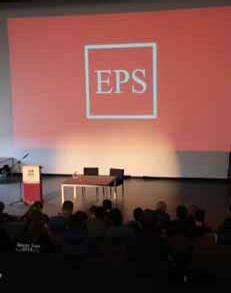
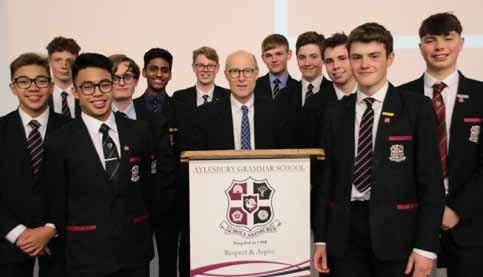
his academic performances and consultant to the World Bank and the European Bank for Reconstruction and Development, tackled the role of economists in everyday society. He gave his views on ‘Why are some country’s rich and others poor?’, ‘How does a market economy work?’ and ‘What is the role of the government?’. He identified 5 markers or as he called it, ‘X factors’ that affects a countries’ Economic success or struggles.
A very inspired evening which was attended by students, academics, the public and alumnae. The event proved to be a huge success with the society garnering all-around praise and donations that will go toward future events.
The future is indeed promising for the society as it looks forward to opening its membership not just to the new Year 10 and above students of AGS but also to the Aylesbury High School Social Sciences Students.
With the support of the AGS’ Development Department, Mrs. Cox and Mrs. Taylor; The Economics and Politics staff and our Head of Year 12 Ms. Treherne, EPS will commence activities straight after the summer break. The society will continue to coordinate activities and invite speakers and other resources to further inspire the students engaged in the field. And it will continue to link the past, present and future AGS and AHS students of Economics and Politics.
Oscar Almadin – Phillips 12
Warhammer
Warhammer club continues to thrive at AGS with a solid cadre of players attending our sessions after school on
Monday in G3. The atmosphere is highly informal with boys either engaging in Warhammer 40K battle or happily chatting to friends while painting their models. Alex has ably stepped up to take the role of leader and organised the team’s participation in this year’s National Warhammer League run by Games Workshop.
This year the format of the competition has changed and the theme was ‘Kill Team’, a new version of the game where opponents field one army of units, each acting independently in a skirmish style battle rather than the traditional armies made up of several units. The rationale is to make the game more accessible and dare I say it, cheaper. On a weekly basis though, the players usually use whatever format they enjoy. The reception to ‘Kill Team’ was mixed, but the club has embraced the changes and on 2nd April, having won their local qualifier, I took the team north to Nottingham to engage in the National semi-finals. As always, we enjoyed the excellent facilities and were awed by both the huge gaming room and of course shops and exhibitions. ‘Bugman’s’ bar provided a good base and a very comfortable café environment for rest and recuperation between matches.
The team fought hard and skilfully in all their battles and in true AGS Warhammer style, were invariably courteous to their opponents. Despite total commitment, we were unable to get into the top 20, which would have ensured progress to the finals so had to settle for a great day out and lessons learnt for next year. Well done to Alex, Oliver, Edward and Aaron for your efforts and I look forward to more of the same in September.
Mr M Goodchild
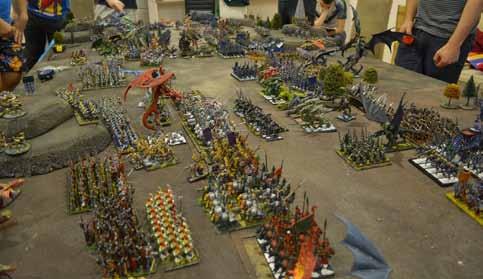
Year 8 Enterprise Day
On Thursday 13th June 2019 all the Year 8 students filed into the lecture theatre to
begin the Enterprise Day. We sat (mostly) in our groups and had to choose a group leader. Then we were given our first of many daunting instructions. We had to think of and name a mascot that would suit Ryman (The High Street stationery company.) This proved achievable to all but 1 or 2 groups. The next task was to develop your mascot more and then see if it fitted with Ryman and its customers. After that we were let out for a refreshing break and given some more tasks to stew over.
After break we had to work on not one, not two, but SIX tasks for our respective character at the same time. Creating a storyboard for your character, making an advert, making a poster, three new items that will be launched, how to advertise and what social media platforms you would use. And even after 2 hours some of us had to spend half our lunch finishing everything off.
After lunch the eight best teams chosen by the leaders of the Ryman challenge who had been prowling around would present the mascot and all the tasks to see which group was the best. Each of the eight groups was judged by Mrs Wilson, Miss Chalk and one of the visiting coaches, Patrick. All of the groups did very well, (Wonder Wiener was a crowd favourite) and everyone was disappointed to hear that the results would be announced the next day in assembly.
Overall, Enterprise day was a very good experience for everyone, and everyone even the teachers enjoyed it.
Thank you to Miss Chalk and Mrs Wilson for organising the event and The Inspirational Learning Group visitors who coordinated the sessions throughout the day.
Sam Wright – Phillips 8
Year 10 Enterprise Activity
From the 7th of June to the 11th of June 2019 Aylesbury Grammar School hosted enterprise days for year 10 students across three school
days. On Friday June 7th we were excused from our period 5 lesson to attend the first enterprise day session.. Here we met our groups for the first time, which we had been assigned in registration on the days preceding, and we were given a brief
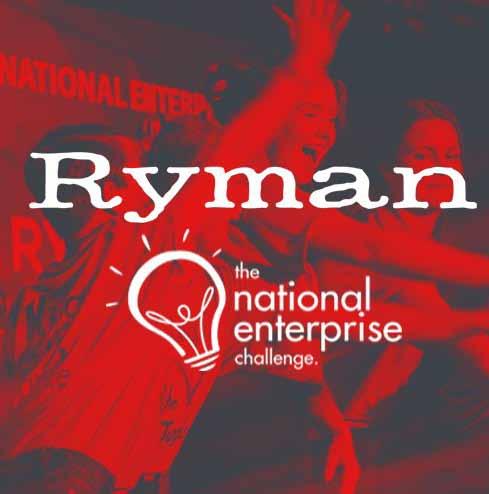
on our aims and objectives across the next few days. We had the task of forming a business idea and recreate the necessary work required to put a business idea into motion. For this we had to create a costing sheet, a presentation board and a presentation, preferably assisted by a powerpoint, to present to a third of the year on the final day and, potentially, if we were chosen to, present to two distinguished guests and all year 10 on the final day.
On the first meeting, my group and I decided on the product we were going to work on, a new product which had a mechanism similar to that of a glue-stick, however containing butter that could be easily spread onto toast without the need for a knife. We began working on our project on Monday, working to complete the costing sheet and the display board, both of which would need to be completed for the following morning. One of the first things we did was to formulate a name for our product, we decided on “spreadsticks”. We also decided that we could use 3D printers to print the spreadsticks, one of which I owned which I could in real life provide for my group. We then began researching using the IT rooms and our computers while one member of our group wrote the costing sheet. Then we worked on the design of the display board and Jack and I printed images off and did extra research to be considered for the display board while two other members printed off articles of text for the board.
On the second morning our group submitted our business plan and finished our display board. Kai Wilkinson, the project manager had finished the prototype, made out of an empty glue stick tube with butter inserted in it. He also had produced a video of him demonstrating it and had brought his i-pad in to display on our display board. Our display board was finished and submitted in the morning and we also then worked on our powerpoint before break. In the afternoon we were split into groups of three and went to different business-skill - related activities, including creating models in groups and deciding on prices and products manufactured to see who could make the most profit, and we did our presentation. Our presentation went smoothly for the most part, and we were confident with how we performed in the final meeting in the lecture theatre. Our group was the first group revealed to be chosen to present to all the year, and the two distinguished guests,
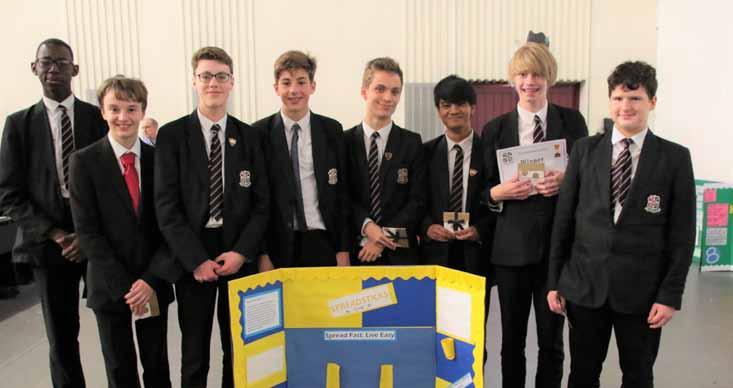
Mr Amor and Mr Hardern, who are both AGS governors with vast amounts of business experience. Our presentation went well with the guests being particularly crediting for our working prototype, and we could enjoy the rest of the presentations. At the end of the third day the awards were given out for each category, including best business plan and best presentation board. Our group won the award for the best presentation - £10 gift cards, where I was chosen to collect the prizes and represent the group. At the end of the ceremony we were also awarded the prize for best business prospect overall, a £20 gift card each where the whole group went to collect the prizes and had photos taken with our display board. Overall, it was a very enjoyable three days where we developed lots of skills and learned about the work needed to start a business prospect and how to do it successfully. I am extremely thankful to the staff including Miss Chalk for organising the event and am happy it will continue for the next year.
James Wilford D10
Young Enterprise - Base National Finals
After school on the 24th June, we (Reiss Chaudhry, Eswar Ambati, Anish Kumar and Mustafa Jarral) all travelled with Miss Chalk up to Birmingham for the BASE National Finals in which only 48 out of 5000 teams got through
to. To get through to the national finals we had to present as a team, a business plan that we had chosen for a business owner to invest in. We had to consider all possible factors ranging from financial to an ethical one. The car journey to Birmingham was spent sleeping, however it ended up being a quick journey taking roughly an hour and a half. When we got there we entered into the Hilton lobby where we saw all the other competitors arriving and as we waited for our room keys and Mustafa, Reiss and Anish all surveyed the competition and strategised picking out the weak teams who were easy targets. We then went up to our rooms and had free time for 2 hours. During that time our fellow economics teacher Mr Davey arrived to support us and was shocked to hear that there was no room service as well! We then headed down for dinner at 7.30, despite getting lost within the hotel we managed to reach the room where dinner was being served, where we all ate food and participated in the game stalls in which Reiss Chaudhry won 2/3 stalls which included a prize. It took us a good 10 minutes to find the lifts and we nearly walked out of an emergency exit however we made it upstairs to our rooms. The next day we all woke up ready and prepared for the task ahead with confidence and determination. Eswar Ambati and Anish Kumar both went down for breakfast while Reiss Chaudhry and Mustafa Jarral remained asleep in bed. Then as a team we all headed down to the room where our task would be presented to us. We were given the task of choosing an ecofriendly business plan for an owner in which we only had 2 hours to decide. With Reiss Chaudhry as the team captain he led the team and decided that the best approach would be to split the tasks up and feedback at the end. We all worked tirelessly. It was nearing the end of our time and we had to rush a little bit due to our over analysis and immense work ethic. However we managed to put together a PowerPoint and a script and we headed into our respective room to present. We were the 5th team to present so the anticipation built up however when it was our
